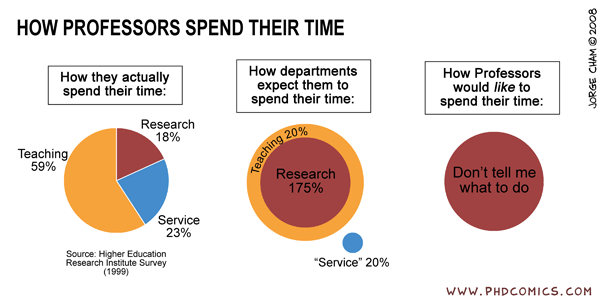First, a disclaimer: I have not written a textbook, and have no plans to in the near future.
But I have to say, this article in Slate that claims that any professor who assigns their own textbook is a Gilderoy Lockhart – or in other words, an “egomaniacal twit” – really angered me. Much as I usually appreciate a good Harry Potter reference, this article showed a fundamental misunderstanding of the life and goals of a college professor. My critique comes down to a three related points.
1) Time. The author claims that professors have “already been paid” to write the book through the university, citing the 40/40/20 (research/teaching/service) breakdown of a professor’s time. But this breakdown of a professor’s time is unrealistic on two counts. First, professors often spend much more of their time on teaching and service than the “40/20” split implies – as this wonderful Ph.D. comic shows.

How Professors Spend Their Time
Second, most professors work much longer than a 40 hour work week just so that they can get that 18% of research done (see also here, here, or here). Now, you can make the argument that as salaried employees, we’re paid to do our job, regardless of the amount of time it takes. But if professors are working 50-70 hours a week, it’s hard to argue that they have already been fully compensated for writing that textbook.
Finally, and most importantly, most professors are paid on a 9-month schedule – and most are not paid at all over the summer (unless you teach a summer course or a grant). Yet this unpaid summer – where we are essentially unemployed – is when many of us get some of our best research done! And for many professors, this is when they are writing their textbooks. So, if you write a textbook during the summer, you have NOT been paid for that work by anyone.
2) Pay. Leaving aside the “double-paid” option, the returns on writing a textbook really aren’t that great. The most recent figures suggest that just about 10% of the total sale price of a textbook goes to the authors – so even with a $400 textbook, a solo author is making less than $50/student. And this is assuming a $400 textbook and no co-authors, both of which are fairly rare. Textbooks are too expensive at around $1200/year (which considering most students take 6-8 classes, not many textbooks are $400) – you’ll get no argument from me on that case – but it isn’t usually the professors themselves who are making substantial amounts of money of a textbook.
3) Expertise. Finally, the author notes towards the end of the article that some professors, especially in math and science, will have to assign their own book because they “literally wrote the book [on the subject.]” But even these professors aren’t supposed to charge for this work – instead, they should “quasi-illegally” send their students a PDF of the book. Really?
While there are undoubtedly some professors who write and assign textbooks because they are “raging narcissists,” I wholeheartedly doubt this is the mainstream. Instead, they probably wrote the book for the reasons they became professors – a love of research, of sharing knowledge, and of teaching. The author acknowledges this may sometimes be the case, but says it is only worth $20 (or better yet free!). And yes, professors also probably wrote the book to improve their professional chances, but that shouldn’t prevent them from receiving acknowledgment and financial restitution for their efforts. Or, as a friend replied on Twitter:
.@ekvraga Oh totally, and if a professional chef tries to cook you dinner at his house then RUN AWAY IMMEDIATELY.
— Emily Thorson (@emilythorson) August 21, 2014
Therefore, if your professor assigns a textbook or an article to your class, don’t run away or assume the worst. Instead, give them a chance to share the passion and insights that created the book with you – you might be surprised with how much you learn.